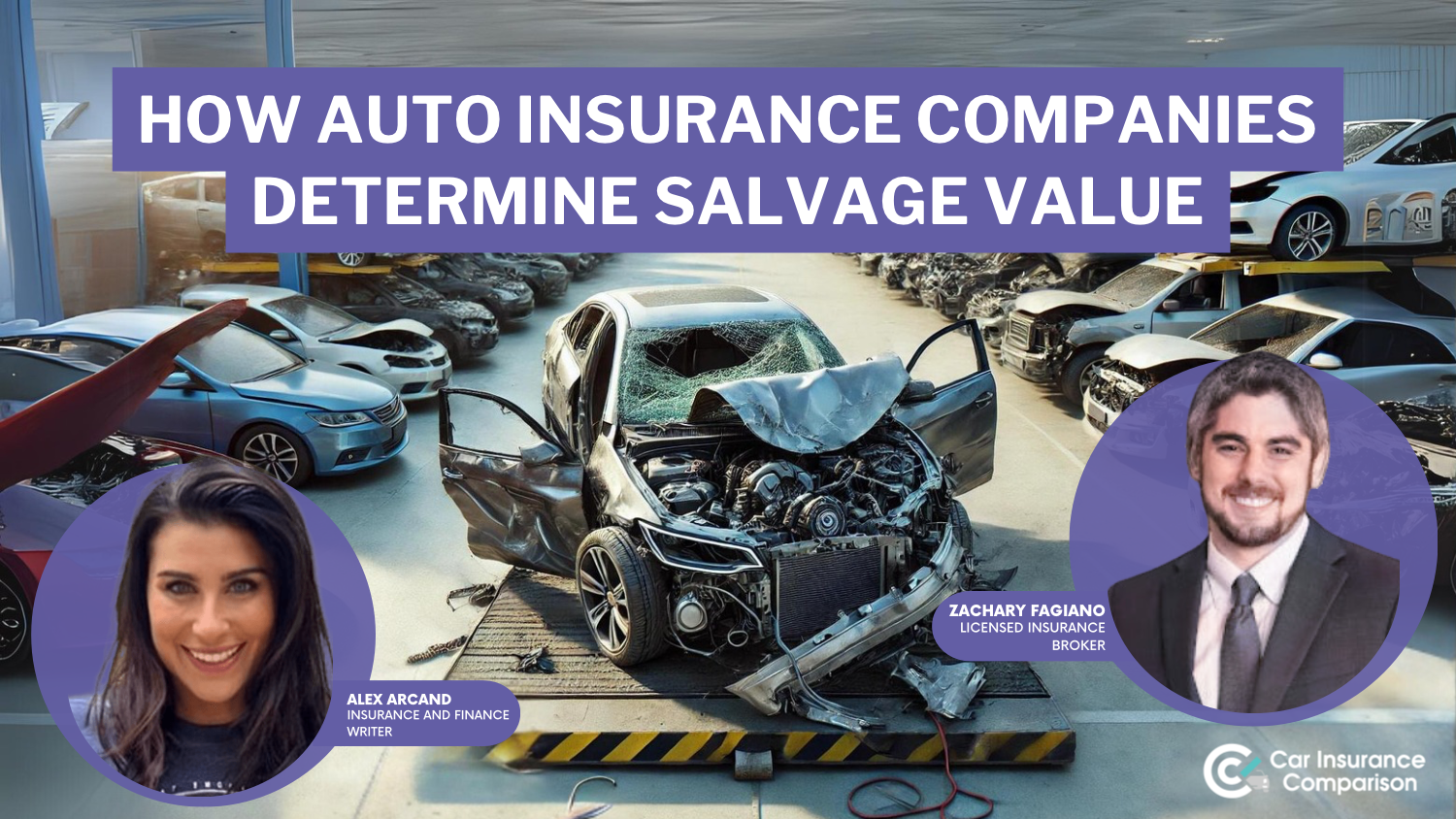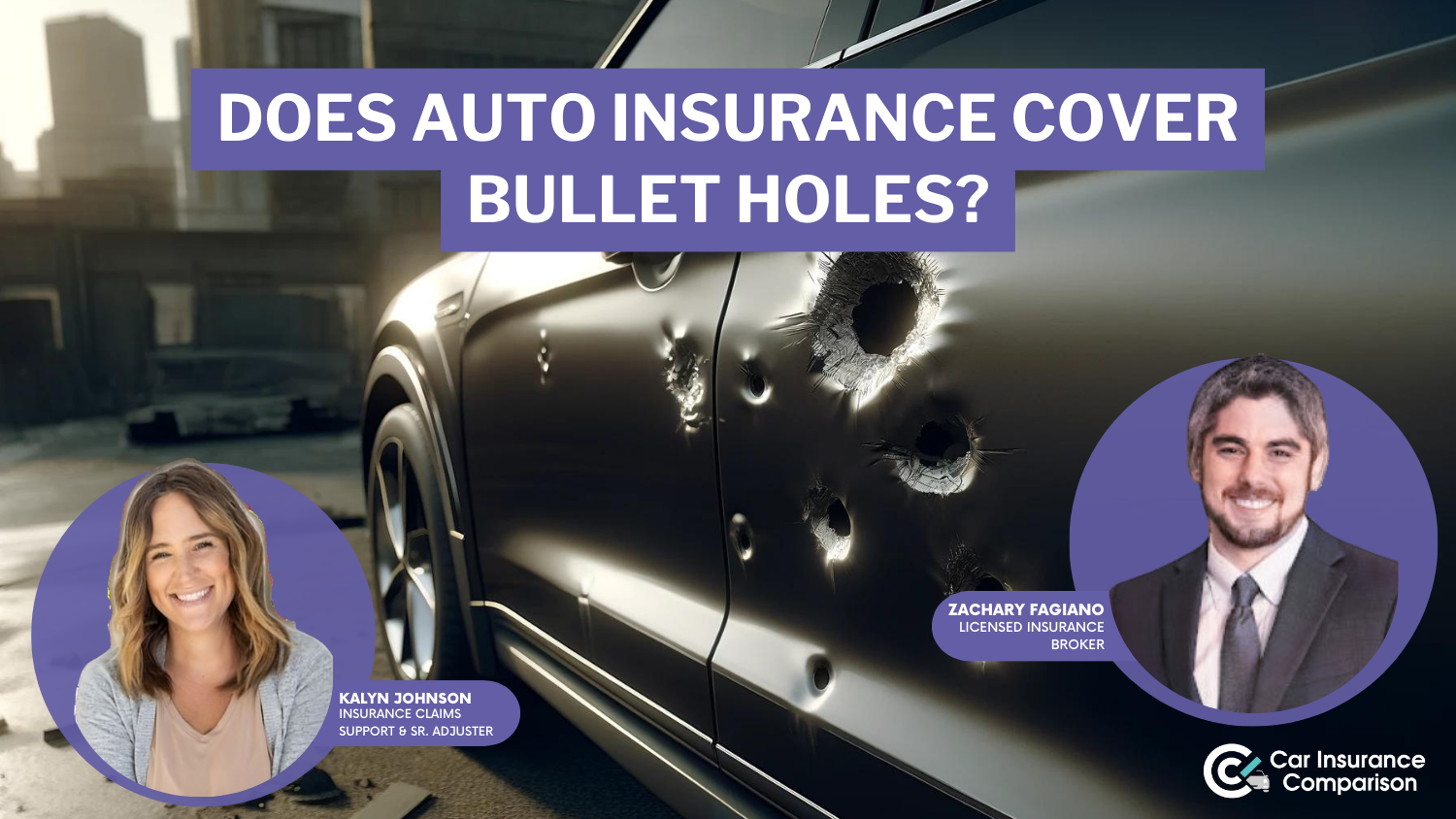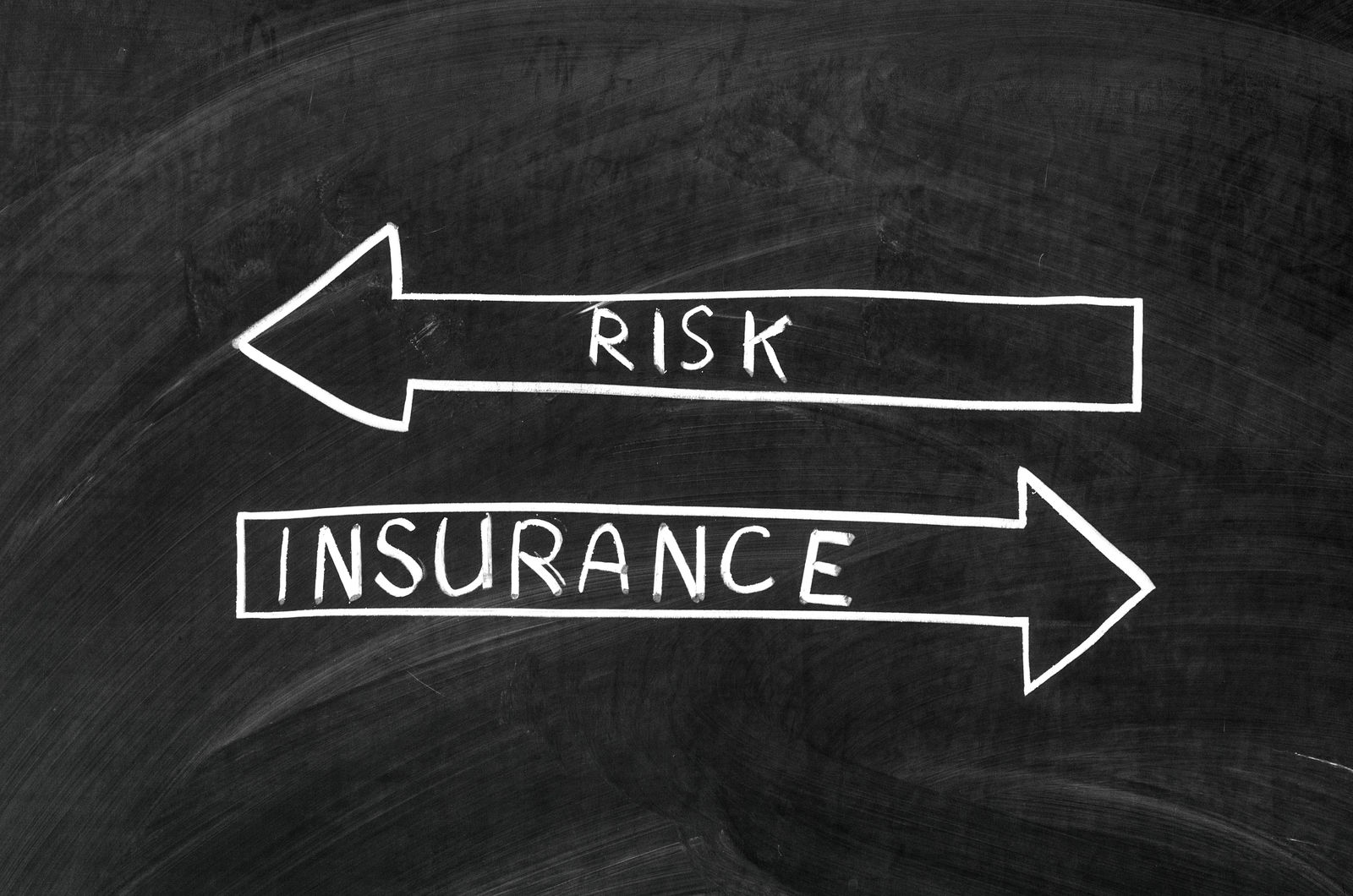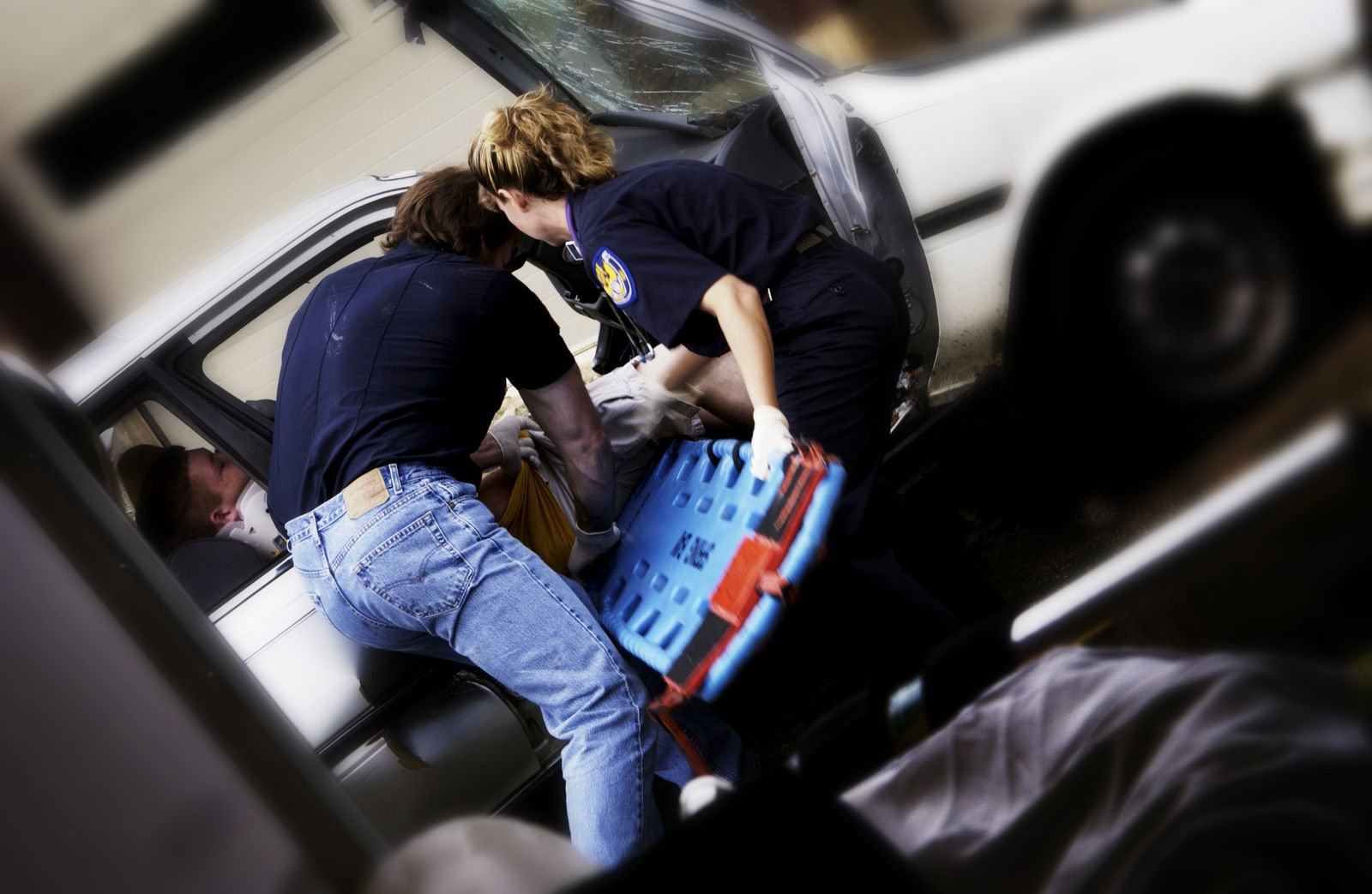How Car Insurance Companies Determine Salvage Value
How car insurance companies determine salvage value for vehicles depends on quite a few factors. A salvage value for your car may be determined through software and databases that establish the street value of the car and compare it against the loss and damage ratio.
Read more Secured with SHA-256 Encryption





Table of Contents
Table of Contents


Insurance and Finance Writer
Alexandra Arcand is an outreach administrator and insurance expert located in North Central Ohio. She has a passion for writing, investing, and education. As an insurance content writer for over three years, Alexandra has first-hand experience in business finance, economics, and real estate. She leads an outreach writing team that specializes in travel, real estate, healthcare, law, finance, an...
Alexandra Arcand


Insurance & Finance Analyst
Zach Fagiano has been in the insurance industry for over 10 years, specializing in property and casualty and risk management consulting. He started out specializing in small businesses and moved up to large commercial real estate risks. During that time, he acquired property & casualty, life & health, and surplus lines brokers licenses. He’s now the Senior Vice President overseeing globa...
Zach Fagiano
Updated January 2025
It’s never a good day when you get into a major accident that leaves you with a totaled vehicle. Even a minor fender bender could leave you with a damaged vehicle that can turn into one of many junk cars out there. However, that doesn’t always mean the end of the car’s life.
Sometimes there is the possibility that the vehicle can get totaled out and then sold at a salvage price for a car. Most companies use a car salvage value calculator to make an offer base on the salvage value of a car. The car insurer has to calculate the salvage car value and you can sometimes get your car back by turning around and buying the car back from your insurance company.
Let’s take a closer look at how insurance adjusters determine the salvage value of a car, how to buy back a totaled car, and more. Take a moment to request free auto policy quotes, in order to help you find good quality service at affordable salvage prices of cars.
- Insurance companies determine the value of salvage cars through a variety of methods
- They must follow the state-mandated rules for total loss or salvage value cars
- Any insurer wants to make sure that an unsafe vehicle is removed from the highway
When is a vehicle’s salvage value determined?
If your car’s damage would cost too much to repair due to collision damages or mechanical issues, your insurer may determine your car a total loss. For example, if a damaged car has a cost of repair that is around $8,000 and a trade-in value of about $3,500, the claims adjuster will determine your car is totaled based on the salvage car prices.
The insurance adjuster will most likely take other factors into consideration when determining the actual cash value (ACV) of the car, including the condition of the interior and the market in which the insured lives.
What is the best way to get the value of your salvage car?
The car insurer may also use other factors in determining the salvage value of a car, including third-party vendor databases. The insurer’s proprietary software system helps the adjuster to calculate the cost of repairs in the local market, including parts and labor. Sometimes, insured drivers believe these information systems don’t provide an accurate projection of costs.
Even if the car can be repaired, and the owner wants to repair the car, most state laws require the car insurer to declare the car a total loss.
If the policy deductible is $1,000 in this example, the insured receives a replacement cash check for just $2,500, rather than the $3,500 it is valued for. The calculation for your settlement check assumes the car’s actual cash value (the trade-in by market) less the deductible. In this example, the insured maintained a higher-than-average deductible policy and probably saved money on their car insurance rates.
So, we’ve looked at the salvage value of a totaled car and what it means. What if you go to trade in your car and you don’t get as much as you expected?
Read more: Differences Between Previous Damage Titles and Salvage Titles
Free Insurance Comparison
Compare Quotes From Top Companies and Save
Secured with SHA-256 Encryption
How does vehicle salvage value compare to depreciated value?
Keep in mind that the car’s repaired trade-in value and the value of a salvage vehicle differ. You will never be able to get as much for your car as the original cost. According to the IRS, if the car has a five-year life, and is purchased at $30,000, then the straight-line depreciation method reduces the car’s value by about $5,000 per usage year.
According to this method, the salvage value of cars for accounting purposes is about $5,000 at the end of its useful life. In reality, the salvage value is realized by the sum total of its parts. Depending upon the condition of the car’s inner operating parts and body, the owner may realize more or less than its depreciated and anticipated salvage value.
A car insurer usually requires the insured to sign over the car’s title in the event of a total loss.
When would you sign your car title over to the insurance company?
The insurer, not the insured, will often decide to sell the car for “junk” and use the services of a salvage yard to dispose of the car. The salvage company decides what parts may be resold, and these parts are then removed from the car. When the car is stripped of parts and frame, the salvage company sells the car’s shell to scrap yards. What’s left of the car is crushed, melted down, and ultimately recycled at scrap prices.
If the salvage company doesn’t decide to strip the car, the car may be provided with a salvage title by the state Department of Motor Vehicles. A salvage title indicates the car isn’t in present drivable condition. If the company decides to sell the car to a repair shop or at auction values, the ultimate buyer may decide to bring the car into drivable condition.
At that time, the car is inspected to determine its drivability and safety. In some states, the salvage title is changed to that of prior salvage, a rebuilt car title, or a similar sounding title name. When the car is resold, a new driver may learn that the car was once a salvage vehicle.
Read more:
- Compare Best Car Insurance Companies That Take Salvage Titles
- When to Sign Your Car Title Over to Your Car Insurance Company
How does a driver buy back a car the insurance company sells at salvage value?
Many drivers mourn a favorite car after the insurer declares a total loss. The insured usually signs over the car title to the insurer. After the insurer disposes of the car, the former owner may seek to repurchase it. The driver may believe they can repair the car at a lower cost than the vehicle claims adjuster’s calculations. Or they may not care about spending the extra money to recover their car.
Depending upon the state in which the driver lives, they may be able to repurchase the car.
State law determines the buy-back age requirement if there is one, or specifics about the car’s drivability. If the state allows the driver to repurchase the car, they may need to have the car retitled from drivable to salvage condition. When the car is repaired, the owner may then retitle the car as a “rebuilt” vehicle.
Each state maintains different laws about when and if the former owner may repurchase a salvage title vehicle. Consult with your financial advisor or attorney about the laws in your state.
How To Properly Insure Your Car
You can get an auto policy for your vehicle, whether it’s brand new or a salvaged vehicle.
Sometimes, you may only be able to get liability coverage on a rebuilt car, due to how the structural integrity of the vehicle may have been altered in a collision. But you can still get coverage for either a clean title car or a salvage title vehicle.
To find out what is the salvage value of your car, you should contact your auto insurance company and ask for the percentage of market value that it uses for determining salvage value.
Free Insurance Comparison
Compare Quotes From Top Companies and Save
Secured with SHA-256 Encryption
Case Studies: How to Determine Salvage Value of a Car
Case Study 1: The Total Loss Declaration
John was involved in a severe collision that caused significant damage to his car. The repair costs estimated by the insurance company amounted to $8,000, while the trade-in value of the car was approximately $3,500.
Considering these figures, the claims adjuster declared John’s car a total loss based on salvage car prices. The insurer took into account other factors such as the car’s interior condition and the local market conditions to determine the actual cash value (ACV) of the vehicle.
Case Study 2: Proprietary Software and Market Research
Sarah’s car sustained extensive damage due to a mechanical issue. Her insurance company utilized proprietary software and third-party vendor databases to assess the repair costs in the local market. By factoring in the prices of parts and labor, the insurer calculated the estimated cost of repairs.
However, state laws mandated the car to be declared a total loss, even if repair was possible. Sarah received a replacement cash check for the car’s actual cash value, considering the deductible.
Case Study 3: Salvage Value vs. Depreciated Value
Michael had purchased his car for $30,000, and it had an estimated five-year life expectancy. According to straight-line depreciation, the car’s value would decrease by around $5,000 per year of usage. As per IRS guidelines, the salvage value of the car after its useful life would be approximately $5,000.
However, the actual salvage value depends on the condition of the car’s components and body, which may result in a higher or lower value.
Case Study 4: Repurchasing a Salvage Vehicle
After Jane’s car was declared a total loss, she decided to buy it back from the insurance company. Depending on state laws and specific requirements, drivers may have the opportunity to repurchase their salvage vehicles.
Jane had confidence in her ability to repair the car at a lower cost than the insurer’s estimation. She explored the legalities involved, including retitling the car as “rebuilt” after repairs, and consulted with her attorney for guidance.

Frequently Asked Questions
What does salvage in insurance mean?
Salvage value refers to the estimated worth of a vehicle after it has been deemed a total loss by the insurance company. It represents the residual value of the vehicle, considering its condition and potential for repair or resale.
How do insurance companies determine the value of a wrecked car?
Insurance companies typically employ a combination of factors to determine the salvage value of a vehicle. These factors may include the pre-accident value of the car, the extent of the damage, the cost of repairs, and the market demand for salvage vehicles. Insurance adjusters or appraisers will assess the condition of the vehicle and calculate an estimated salvage value based on these factors.
Why is salvage value important to insurance companies?
Salvage value is important to insurance companies as it helps them determine whether it is more cost-effective to repair a damaged vehicle or declare it a total loss. By comparing the estimated salvage value to the cost of repairs, insurance companies can make informed decisions about the most appropriate course of action.
Can I negotiate the salvage value with my insurance company?
In some cases, you may be able to negotiate the salvage value percentage with your insurance company. However, it is important to note that salvage value is typically determined by professional appraisers who consider various factors. If you believe the salvage value is inaccurately assessed, you can provide evidence to support your case and request a reassessment.
Can you keep your car if it’s totaled?
When insurance totals your car, you can you keep it. However, if you decide to keep your car after it has been declared a total loss, the insurance company will deduct the salvage value from the settlement amount they would have paid you. You will need to sign a release form acknowledging that you have retained ownership of the salvage vehicle and will be responsible for any repairs or future liabilities associated with it.
How to calculate the salvage value of a car?
Wondering how to determine the salvage value of a car? One common method to estimate the salvage value of a car is to determine what the car would be worth if sold for parts or scrap metal.
How do I find the salvage value of my car?
So, how to find the salvage value of a car? You can consult with appraisers, salvage yards, or online resources to get an estimate of your car’s salvage value.
How is the salvage value of a car determined?
Salvage value is determined based on various factors including the car’s condition, age, market demand for its parts, and the potential for repairs.
Why do insurance companies deduct salvage value?
Insurance companies deduct salvage value from a claim payout because they may sell the damaged vehicle to recoup some of their losses. By deducting salvage value, insurers aim to minimize their financial exposure and prevent overcompensation to policyholders.
What is salvage deduction in insurance?
Salvage deduction refers to the reduction in a claim payout by the salvage value of a damaged vehicle. When an insured vehicle is deemed a total loss, the insurance company subtracts the salvage value from the settlement amount before reimbursing the policyholder.
Can you drive a car with a salvage title?
How bad does hail damage have to be to total a car?
How can a car have a salvage title but no accident happened?
How can I total my car?
How do I know if my car has a salvage title?
At what percentage do insurance companies total a car?
How do insurance companies determine actual cash value?
How do insurance companies determine how much to pay for a totaled car?]
How do insurance companies determine market value of a car?
Does salvage title affect insurance cost?
Does salvage title insurance cost more?
Does side airbag deployment total a car?
Does State Farm insure salvage title cars?
Does the insurance company take your car when it’s totaled?
Does total loss mean salvage?
Does USAA cover salvage titles?
Do I have to pay taxes on a totaled car?
Can you insure a car with a salvage title?
Can you get full coverage insurance on a salvage title?
Does insurance take your car if it’s totaled?
Do you have to accept an insurance offer on a totaled car?
Do you pay a deductible if your car is totaled?
Does a car get totaled if the airbags deploy?
Does Liberty Mutual cover rebuilt titles?
Does insurance cover diminished value of a car?
Does insurance give you money for a totaled car?
Can a car be totaled due to mechanical failure?
Get a FREE Quote in Minutes
Insurance rates change constantly — we help you stay ahead by making it easy to compare top options and save.







